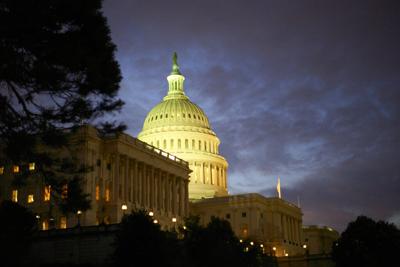American politics is awash in money — and it’s changing the way democracy works. While political candidates need cash to compete, the sheer volume of money in elections today is nothing short of alarming.
In 2020, a total of $8.7 billion was spent in congressional races and $5.7 billion in the presidential race. That’s three times more than in 2000.
The cost of Senate elections has skyrocketed. Spending by the average Senate winner increased 72% between 2018 and 2020. In the last election, $240 million was spent on a Senate race in South Carolina, a state not much bigger than Louisiana.
Spending by outside groups — especially nonprofits and super PACs — is jacking up total outlays. In 2020, for example, $222 million was put into the North Carolina Senate race by outside groups, and that’s over and above money spent by candidates.
Then there is the recent story about a Republican electronics mogul named Barre Seid, who has given $1.6 billion to a new nonprofit, Marble Freedom Trust, to support conservative causes. And GOP megadonors Kenneth Griffin, Richard Uihlein and Peter Thiel have each poured more than $30 million into this election cycle.
Don’t fret for Democrats. They have plenty of billionaires, nonprofits and unions in their corner. A New York Times study found that 15 nonprofits that support Democratic causes coughed up a total of $1.5 billion in the last election. George Soros has already given $126 million to pro-left, pro-Democratic groups in this election.
There are four drivers of this mad money rush. The first is government itself. As bureaucracies, laws and regulations swell, more people, interest groups and companies have reasons to influence them. The second is technology. New online tools have made it possible to quickly harvest an immense amount of small-dollar donations. The third is partisan polarization; as one side’s hatred for the other side deepens, the willingness to give money goes up.
The fourth, and often overlooked, driver of campaign costs is campaign finance law and regulation. In the 1970s, Congress attempted to take money out of politics by imposing a complicated set of caps on federal contributions. Lawmakers also required disclosure of most campaign dollars. Altered by subsequent amendments and court rulings, these rules still apply.
While disclosure has made the system more transparent, other regulations designed to reduce money in politics have badly backfired. A Rube Goldberg-style contraption of complex rules and bureaucratic red tape has been created around campaign finance; only the cuckoo coming out of the clock is missing.
Under the law, individuals cannot donate more than $2,900 to federal candidates. To get around this and other contribution limits, a whole new political-industrial complex of nonprofits and super PACs has developed. It is the hidden wizard “behind the curtain” of American politics.
For outside groups to spend without limitation, they can’t legally coordinate with the candidates they’re helping. This allows office seekers to sidestep responsibility for messages delivered by these groups on their behalf — which often include scurrilous attacks on their opponents. It’s become hard for voters to distinguish ads paid for by candidates from those funded by independent organizations.
An unintended consequence of campaign finance regulation has been to institutionalize political money. It has put punishing pressure on politicians, interest groups and parties to become full-time fundraising machines, and it incites them to use extreme and divisive rhetoric to scare donors into giving.
Some say this was all caused by the Citizens United Supreme Court decision. Not so. That ruling made it easier for corporations and unions to spend money on politics, but it didn’t open the door on independent expenditures; that door was opened in the 1970s by Congress and the Court’s landmark Buckley decision.
How to fix it?
Our campaign laws need a spring cleaning. Eliminating contribution caps would reduce dark money and untangle the mysterious conduits; candidates would become directly responsible for more of the dollars received and spent in their elections. We also need full public disclosure of every campaign dollar. Sunshine is often the best disinfectant.
Remember the old adage — when somebody says it’s not about the money, it’s about the money? The fraying of our democracy is about a lot of high-flying things, but don’t kid yourself, it’s also about the money.
Ron Faucheux is a nonpartisan political analyst based in New Orleans. He publishes LunchtimePolitics.com, a free nationwide newsletter on public opinion.

